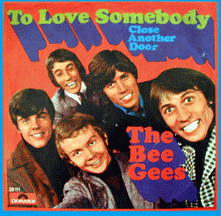| "To Love Somebody" | ||||
|---|---|---|---|---|
 | ||||
| Single by the Bee Gees | ||||
| from the album Bee Gees' 1st | ||||
| B-side | "Close Another Door" | |||
| Released | 30 June 1967 | |||
| Recorded | April 1967 | |||
| Genre | ||||
| Length | 3:02 | |||
| Label | ||||
| Songwriters | ||||
| Producers | ||||
| The Bee Gees UKsingles chronology | ||||
| ||||
| The Bee Gees USsingles chronology | ||||
| ||||
| Alternative cover | ||||
 Japanese cover of "To Love Somebody" | ||||
| Music video | ||||
| "To Love Somebody" on YouTube | ||||
"To Love Somebody" is a song written by Barry and Robin Gibb. Produced by Robert Stigwood,it was the second single released by the Bee Gees from their international debut album, Bee Gees 1st ,in 1967. [4] The single reached No. 17 in the United States and No. 41 in the United Kingdom. The song's B-side was "Close Another Door". [5] The single was reissued in 1980 on RSO Records with "How Can You Mend a Broken Heart" as its flipside. The song ranked at number 94 on NME magazine's "100 Best Tracks of the Sixties". [6] The entry was a minor hit in France but reached the top 10 in Canada.
Contents
- Origins and lyrics
- Release and reception
- Personnel
- Charts
- Weekly charts
- Year-end charts
- Certifications
- Michael Bolton version
- Charts 2
- Other cover versions
- References
In a 2017 interview with Piers Morgan's Life Stories ,Barry was asked "of all the songs that you've ever written,which song would you choose?" Barry said that "To Love Somebody" was the song that he'd choose as it has "a clear,emotional message". [7] The song has been recorded by many other artists,most prominently by Michael Bolton,Narvel Felts,the Sweet Inspirations,Nina Simone and Jimmy Somerville.

